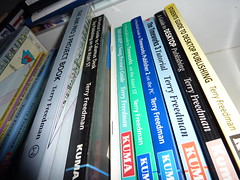 It's important to be published by a traditional publisher
It's important to be published by a traditional publisher
Image by Terry Freedman via Flickr
In this day and age, in which anyone can publish and distribute their books electronically, or self-publish them by going down several routes (none of which need include the traditional vanity publisher), why should anyone bother approaching a traditional publisher? After all, very few of the thousands of manuscripts that publishers receive find their way into book form, and of those that do, very few hit the big time. There are, in fact, at least 4 reasons to try to get published by the age-old process of going to publishers.
Having a book published:
Marks you out as a REAL author
I don’t think I’m giving away any secrets when I say that publishers, on the whole, are pretty hard-nosed creatures. If they think a book won’t sell, they won’t publish it. Why would they? Publishers receive thousands of manuscripts each year from wannabe writers, most of which are rejected. If you’re one of that happy minority whose manuscript is accepted, you can be sure that, in the eyes of a third party who is mainly concerned with profit, it has some merit. (I am, of course, not including academic publishing in this generalisation, nor those small independent publishers who are primarily concerned with “culture”, however defined.)
If this sounds rather uncompromising, think of the alternative. Someone was telling me a few weeks ago that he has led such an interesting life that his family and friends continually urge him to write his autobiography, and he has decided to do so. Why would anyone outside his circle of family and friends be remotely interested? HIs book will probably never be published by a third party, and if by some miracle it is, nobody will buy it. The only sensible route for this chap to go down is to self-publish the book and give copies of it away to his friends and relatives. But the publication will impress nobody else.
Now, suppose you write a book whose subject matter would appeal to a wider readership. If you can’t write well, your manuscript still won’t be accepted by a publisher. Many people think they can write, but they really cannot – and that isn’t just evidence of snobbery on my part, but which countless articles and books featuring interviews with agents, editors and publishers say all the time.
So being published by a proper publisher tells the world that (a) you have something to say which is of interest to a fair number of people, and (b) you have the ability to write in a way which engages the reader.
Establishes you as an expert
If you’ve written a non-fiction work, that is. Self-publishing is also a good way of establishing yourself as an expert, but even these days it is viewed with some suspicion. Having a book published by a “real” publisher indicates that someone besides yourself recognises your expertise too.
Makes you eligible to join professional associations
For example, I belong to the UK’s Society of Authors, which does allow self-published authors to join as full members – if they have sold over 200 copies of a single title in a 12 month period. That takes some doing, especially if your book is fiction, and nobody has heard of you. Being a member of the Society affords various benefits, not the least of which is excellent advice on contracts offered.
Helps you reach a larger readership
It’s true that we can all promote ourselves on the internet, and it;s true that every author complains that their publisher does too little to promote their book. But the fact remains that publishers’ catalogues and/or sales people go all over the place. In education, for example, catalogues are often sent to every school in the country and sales people display their wares in school staffrooms. When a book does get featured by the publisher, it can immensely well. (I know of at least two people who were able to go over to part-time working on the basis of their royalty earnings from a best-selling textbook; it doesn’t happen often, but it’s probably even less likely to happen if you were to self-publish a textbook.)
For these four reasons alone, I think it is too early yet to be sounding the death-knell of the traditional publishing company.
This article was first published in February 2011.
